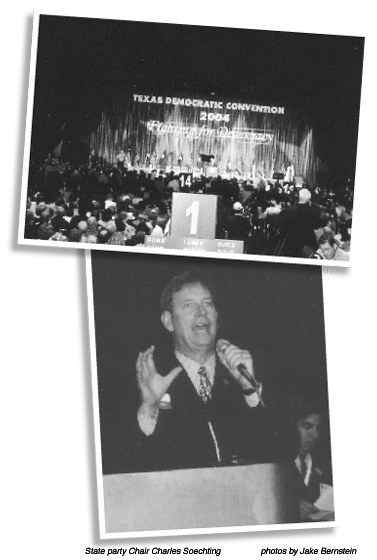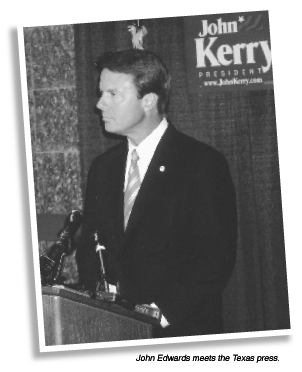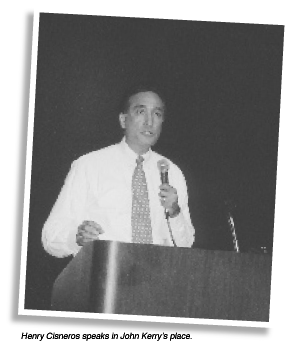Dems da Breaks
They've got energy and new faces, but can Texas Dems get organized to bring home the votes?
The first general session of the Texas Democratic Party’s convention in Houston on June 18 began inauspiciously. The party had planned to open the convention with a tribute to the armed forces. Two weeks earlier at the state GOP convention, Republicans had put on an ostentatious display of symbolic patriotism that included a video and musical homage to all five branches of the military. Now came Democrats’ turn. The convention hall’s enormous screens flashed pictures of Texas soldiers killed in Iraq. But the sound system that was supposed to play “The Battle Hymn of the Republic” faltered. After a few faint strands, the speakers gurgled and cut out entirely. With the sound system on the fritz, a video honoring state Rep. Rick Noriega (Houston), a major in the army reserves who was recently called to duty in Afghanistan, became a kind of odd silent movie. In these days of carefully stage-managed political conventions, it was an unusual sight, and representative of the convention’s overall level of organization.
The spectacle of thousands of Democrats sitting in unintentional silence seemed an apt metaphor for a party with little voice in the current political debate. The GOP controls every statewide office and both houses of the Legislature. As the Democrats gathered for their biannual convention, at the George H. Brown Convention Center, the party that once dominated Texas had become the political version of basketball’s Washington Generals, those earnest losers who offer themselves up as fodder for the showboating Harlem Globetrotters.
After the Noriega film, state party Chair Charles Soechting, presiding over his first convention, strode to the microphone and apologized for the sound system’s foibles. Then he asked all the delegates attending their first state convention to stand up. As they did, the mood in the hall changed abruptly. When roughly 80 percent of the seated delegates rose, even Soechting seemed taken a back. “Wow!” he said from the stage. “I wish you could see this from our view up here.” The crowd roared. With so many first-timers, attendance at the convention-—more than 8,000 delegates—was nearly doubled the 4,500 who gathered in El Paso two years ago, and dwarfed the 3,500 who participated in 2000. Not only were there more people, but they brought with them a new zeal, due in no small part to the campaigns of Howard Dean and Dennis Kucinich and to MoveOn.org. Despite having no high-profile statewide races on the ballot and little chance of the president losing his home state, grassroots activists arrived at the convention suffused with a unity and vigor not seen in years.

The convention was a tale of a two-layered party. At the top, the Democratic leaders squabbled, although less so than in previous years, and presided over a poorly organized weekend. At the bottom, the suddenly populous grassroots were energized by a long-lost sense of purpose and activism, a feeling that their party, dominated recently by a small band of consultants, is theirs for the retaking.ord, please forgive us the back-biting of the past,” asked Houston minister Suzan Carter of the Almighty in her invocation during Friday’s night’s session. “Lord, help us to work together.” For Texas Democrats, fostering unity may indeed require divine intervention.
The sense of unity began to unravel even before the convention started. Several state House members were grumbling that state Rep. Sylvester Turner (D-Houston) shouldn’t be allowed to address the convention because of his close relationship with Speaker Tom Craddick (R-Midland). Both Turner and state Rep. Helen Giddings (D-Dallas) accompanied the speaker on a mid-June photographic safari to South Africa, according to press reports. Soechting had opted to let Turner speak, but due to an apparent scheduling snafu over the time of his speech on the last day, Turner left the convention before his scheduled talk. On his way out, Turner offered reporters a few parting shots at his colleagues, including an accusation that Soechting lied to him about his speaking time.
The spat between Turner and more hardened partisans such as state Rep. Garnet Coleman (D-Houston) was just one of several headaches for Soechting. The convention was a coming-out party of sorts for the chairman, who was elected last fall and ran unopposed for a full two-year term. He’s already proved himself a sharp-tongued party messenger, gleefully deriding the Republican leadership’s recent travails with school-finance overhaul and the GOP’s fundamentalist-driven platform. Unfortunately for Soechting, his first convention as front man suffered from atrocious planning.
Friday’s general session didn’t begin until after 6 p.m. The session’s late start ensured that the keynote address by North Carolina Senator John Edwards—who finished his talk at 8:20 p.m.—failed to meet the early deadlines for the state’s major daily newspapers, robbing the speech of much play in the media. The next day’s Houston Chronicle metro section featured instead a front-page story about Turner’s bickering with fellow state reps. Edwards, meanwhile, was relegated to the inside pages. Party officials also inexplicably waited until convention’s end to introduce the Democratic nominees for this fall’s state and federal elections. When they finally got on stage late Saturday afternoon, the hall was nearly empty. (In contrast, Republicans feted their candidates on the first afternoon of the GOP convention.)Edwards was the convention’s headliner. The smooth-talking North Carolina senator with the boyish good looks is barnstorming the nation for presumed Democratic nominee John Kerry. (Henry Cisneros, former San Antonio mayor and Clinton cabinet member, spoke in Kerry’s place earlier in the day.) While assiduously avoiding comment on whether he is a front runner for the vice presidential spot on the ticket, Edwards’ campaign stop in the Lone Star State made it clear whom Texas Democrats prefer. Delegates greeted Edwards’ entrance with a lengthy ovation. Several hundred of them rushed to the foot of the stage to snap photos.

Edwards is as talented a public speaker as advertised. He warmed to the crowd’s energy, tossing out applause lines to an audience ravenous for a winner. Edwards pinned ultimate responsibility for the Iraq prisoner abuse scandal on “the Commander in Chief…. Where I come from, we say a fish stinks from the head down,” he said. Then came, “George Bush’s healthcare plan is hope and pray you don’t get sick.” And, “I’ll tell you what would be good for this economy… would be to outsource this administration.” Delegates interrupted Edwards with frequent ovations and chants of “VP, VP, VP.” When his speech ended, Edwards was mobbed along the railing that rimmed the stage. He shook as many hands as he could. When the cheering didn’t subside, Edwards jumped back on stage for a curtain call, and the fired up crowd roared again. It was the kind of moment that inspires party loyalists to, say, drive to New Mexico—a state actually in play in the presidential election—to campaign. On Saturday morning, delegates were still buzzing about Edwards’ speech the night before, but the rejuvenated spirit of the party’s grassroots activists was even more evident at the convention’s workshops. The Texas Freedom Network put on a well-attended session devoted to “reclaiming the values of faith, family, and freedom.” It proved a well-thought out rebuttal to Republican efforts to claim religion for themselves. Pastor Kyle Childress of Austin Heights Baptist Church in Nacogdoches pointed out the Bible has a lot more to say about wealth and poverty than it does about the sexual issues over which Republicans often obsess. “Those folks on the Hill up there, they don’t have the corner on faith,” he said.

U.S. Congressman Nick Lampson (D-Beaumont), a practicing Catholic, then observed that Democrats in Congress vote in concordance with the agenda of the United States Conference of Catholic Bishops about 60 percent of the time as opposed to Republicans who support the church’s stances only 40 percent of the time. Yet the GOP gets credit for being more in tune with the bishops because of one issue, abortion. “We got ourselves as Democrats twisted into a corner and we just cowered,” he told the crowd.
Across the hall, every one of the several hundred seats were filled in the “Growing the Grassroots” seminar (State Rep. David Farabee (D-Wichita Falls) was among the several dozen attendees forced to sit on the floor in the back). The session was organized by Democracy for Texas, the organization formed from the remnants of Howard Dean’s presidential campaign. Many of the first-time delegates were former Deaniacs. It was a diverse crowd: the young, pierced, and tattooed sat next to the white-haired, all of them listening to tips on running meet-ups and political house parties. The workshop speakers delved into the details of exactly how to fundraise, organize, and run for office.
Another popular gathering point for the convention’s newbie delegates was Ohio Congressman Dennis Kucinich. On Saturday afternoon, they got to see their man address the convention. Although ostensibly still a participant in the presidential race, Kucinich urged the crowd to help get John Kerry elected. Some of his biggest applause lines came when he demanded that the United States leave Iraq and put an end to Halliburton’s contracts underpinning the occupation.
After Kucinich’s speech, the fervor in the convention hall steadily melted away as delegates left town. What remained is the question of whether the Democratic Party and its candidates can marshal that grassroots energy to build a pathway back to power.


